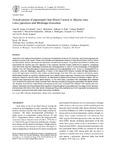Por favor, use este identificador para citar o enlazar este ítem:
http://www.alice.cnptia.embrapa.br/alice/handle/doc/926601Registro completo de metadatos
| Campo DC | Valor | Lengua/Idioma |
|---|---|---|
| dc.contributor.author | SOARES-CAVALCANTI, N. M. | pt_BR |
| dc.contributor.author | BELARMINO, L. C. | pt_BR |
| dc.contributor.author | KIDO, E. A. | pt_BR |
| dc.contributor.author | PANDOLFI, V. | pt_BR |
| dc.contributor.author | MARCELINO-GUIMARÃES, F. C. | pt_BR |
| dc.contributor.author | RODRIGUES, F. A. | pt_BR |
| dc.contributor.author | PEREIRA, G. A. G. | pt_BR |
| dc.contributor.author | BENKO-ISEPPON, A. M. | pt_BR |
| dc.date.accessioned | 2012-06-18T11:11:11Z | pt_BR |
| dc.date.available | 2012-06-18T11:11:11Z | pt_BR |
| dc.date.created | 2012-06-18 | pt_BR |
| dc.date.issued | 2012 | pt_BR |
| dc.identifier.citation | Genetics and Molecular Biology, Ribeirão Preto, v. 35, n. 1, suppl., p. 247-259, May 2012. | pt_BR |
| dc.identifier.uri | http://www.alice.cnptia.embrapa.br/alice/handle/doc/926601 | pt_BR |
| dc.description | Heat shock (HS) leads to the activation of molecular mechanisms, known as HS-response, that prevent damage and enhance survival under stress. Plants have a flexible and specialized network of Heat Shock Factors (HSFs), which are transcription factors that induce the expression of heat shock proteins. The present work aimed to identify and characterize the Glycine max HSF repertory in the Soybean Genome Project (GENOSOJA platform), comparing them with other legumes (Medicago truncatula and Lotus japonicus) in view of current knowledge of Arabidopsis thaliana. The HSF characterization in leguminous plants led to the identification of 25, 19 and 21 candidate ESTs in soybean, Lotus and Medicago, respectively. A search in the SuperSAGE libraries revealed 68 tags distributed in seven HSF gene types. From the total number of obtained tags, more than 70% were related to root tissues (water deficit stress libraries vs. controls), indicating their role in abiotic stress responses, since the root is the first tissue to sense and respond to abiotic stress. Moreover, as heat stress is related to the pressure of dryness, a higher HSF expression was expected at the water deficit libraries. On the other hand, expressive HSF candidates were obtained from the library inoculated with Asian Soybean Rust, inferring crosstalk among genes associated with abiotic and biotic stresses. Evolutionary relationships among sequences were consistent with different HSF classes and subclasses. Expression profiling indicated that regulation of specific genes is associated with the stage of plant development and also with stimuli from other abiotic stresses pointing to the maintenance of HSF expression at a basal level in soybean, favoring its activation under heat-stress conditions. | pt_BR |
| dc.language.iso | eng | eng |
| dc.rights | openAccess | eng |
| dc.subject | Bioinformática | pt_BR |
| dc.title | Overall picture of expressed Heat Shock Factors in Glycine max, Lotus japonicus and Medicago truncatula. | pt_BR |
| dc.type | Artigo de periódico | pt_BR |
| dc.date.updated | 2012-07-23T11:11:11Z | pt_BR |
| dc.subject.thesagro | Soja | pt_BR |
| dc.subject.thesagro | Gene | pt_BR |
| dc.subject.thesagro | Genoma | pt_BR |
| dc.subject.nalthesaurus | Bioinformatics | pt_BR |
| dc.subject.nalthesaurus | Soybeans | pt_BR |
| dc.subject.nalthesaurus | Genome | pt_BR |
| dc.subject.nalthesaurus | Genes | pt_BR |
| dc.subject.nalthesaurus | Abiotic stress | pt_BR |
| dc.subject.nalthesaurus | Transcription factors | pt_BR |
| riaa.ainfo.id | 926601 | pt_BR |
| riaa.ainfo.lastupdate | 2012-07-23 | pt_BR |
| dc.contributor.institution | NINA M. SOARES-CAVALCANTI, UFPE; LUÍS C. BELARMINO, UFPE; EDERSON A. KIDO, UFPE; VALESCA PANDOLFI, UFPE; FRANCISMAR CORREA MARCELINO, CNPSO; FABIANA A. RODRIGUES, CNPSo; GONÇALO A. G. PEREIRA, UNICAMP; ANA M. BENKO-ISEPPON, UFPE. | pt_BR |
| Aparece en las colecciones: | Artigo em periódico indexado (CNPSO)  | |
Ficheros en este ítem:
| Fichero | Descripción | Tamaño | Formato | |
|---|---|---|---|---|
| gmb.overall.v35n1s.247259.2012.pdf | 1,88 MB | Adobe PDF |  Visualizar/Abrir |









